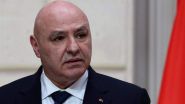
Lebanon is witnessing a surge of high-level diplomatic visits as Israeli attacks intensify in the South and Bekaa, raising questions about whether this diplomatic activity seeks to calm tensions or apply greater pressure on Hezbollah’s disarmament.
Arab League Secretary-General Ahmed Aboul Gheit and U.S. Special Envoy Morgan Ortagus arrived in Beirut on Monday, while U.S. envoy Tom Barrack and Egyptian intelligence chief Hassan Rachad are also expected in the capital.
Aboul Gheit’s visit coincides with his participation in the Arab Media Forum and the Regional Conference on Judicial Cooperation in Counterterrorism. His agenda includes meetings with Lebanese leaders to reaffirm the Arab League’s support for Lebanon’s sovereignty amid ongoing Israeli aggression.
Warnings of a New Confrontation
According to journalist and political analyst Ali Hamadeh, the surge in diplomatic activity reflects mounting concern over Lebanon’s stability.
“The activity of envoys has increased significantly, and this is natural given the rising dangers in Lebanon, particularly the risk of a new war between Israel and Hezbollah,” he told This is Beirut. “Israeli threats are clear, and American warnings are explicit as well.”
Hamadeh pointed to Barrack’s recent statement warning that if the Lebanese government fails to disarm Hezbollah, the group could face a “major confrontation” with Israel.
U.S. Pressure and Fear of Expansion
Ortagus’ arrival comes amid growing fears that Israel may soon launch a new campaign targeting Hezbollah. Security sources told Sky News Arabia that her mission focuses on preventing further deterioration or expansion of the fighting.
Over recent days, Israel intensified its bombardment of southern and eastern Lebanon, killing more than ten people, most of them Hezbollah members, according to Lebanese security officials cited by Reuters.
Ortagus’ meetings in Beirut are expected to emphasize that “delays or inaction regarding Hezbollah’s weapons cannot happen,” Hamadeh noted. Her visit also aligns with her role in the Mechanism Committee overseeing the ceasefire between Israel and Hezbollah.
Regional Coordination and Egypt’s Message
Parallel to Washington’s engagement, Cairo is also stepping in. Egyptian intelligence chief Hassan Rachad is set to meet Lebanese leaders with a message reflecting regional concern over the intensification of Israel’s military operations.
Egyptian Ambassador to Lebanon Alaa Moussa said Monday that Rachad’s visit “falls within the framework of political and security coordination with Lebanon,” stressing that “Egypt supports President Joseph Aoun’s stance on limiting weapons to the state.”
“The growing scale and pace of Israeli attacks call for caution,” Moussa added, reaffirming that Cairo “backs the Lebanese president’s position on exclusive state control of arms and his readiness to enter negotiations.”
Rising Regional Alarm
Hamadeh said the ongoing diplomatic wave is tied both to Israel’s escalation and to the broader question of Hezbollah’s arsenal.
“The recent escalation in Israeli attacks stems from a growing conviction, reinforced by Hezbollah officials themselves, that the group has rebuilt part of its military capabilities and continues to strengthen them despite the state’s decision for its disarmament,” he explained.
Meanwhile, European sources told Sky News Arabia that a large-scale Israeli strike on Lebanon “could be only a matter of time,” with discussions reportedly ongoing within Israel’s security establishment about the “strategic necessity of a preventive operation” against Hezbollah.
Those sources added that it remains unclear whether Israel would treat Lebanon as a complicit or failed state regarding Hezbollah’s weapons.
Uncertain Path to De-escalation
As for whether this diplomatic push could bring calm, Hamadeh was cautious. “De-escalation depends on two main factors,” he said. “Hezbollah must cooperate with the state and begin seriously surrendering its weapons north of the Litani River, and the Lebanese government must act decisively without hesitation. Otherwise, tensions will persist and gradually rise toward a major confrontation, just as Tom Barrack warned.”
In a recent post on X titled “A Personal Perspective: Syria and Lebanon Are the Next Pieces for Levant Peace,” Barrack argued that Hezbollah’s disarmament is central to Lebanon’s sovereignty and that failure to act could invite unilateral Israeli action.
“Should Beirut continue to hesitate,” he wrote, “Israel may act unilaterally, and the consequences would be grave.”
For now, the influx of envoys underscores growing international and regional alarm that Lebanon may be approaching a critical juncture, one where diplomacy may no longer be enough to contain the fallout of Israel’s ongoing military campaign.




Comments